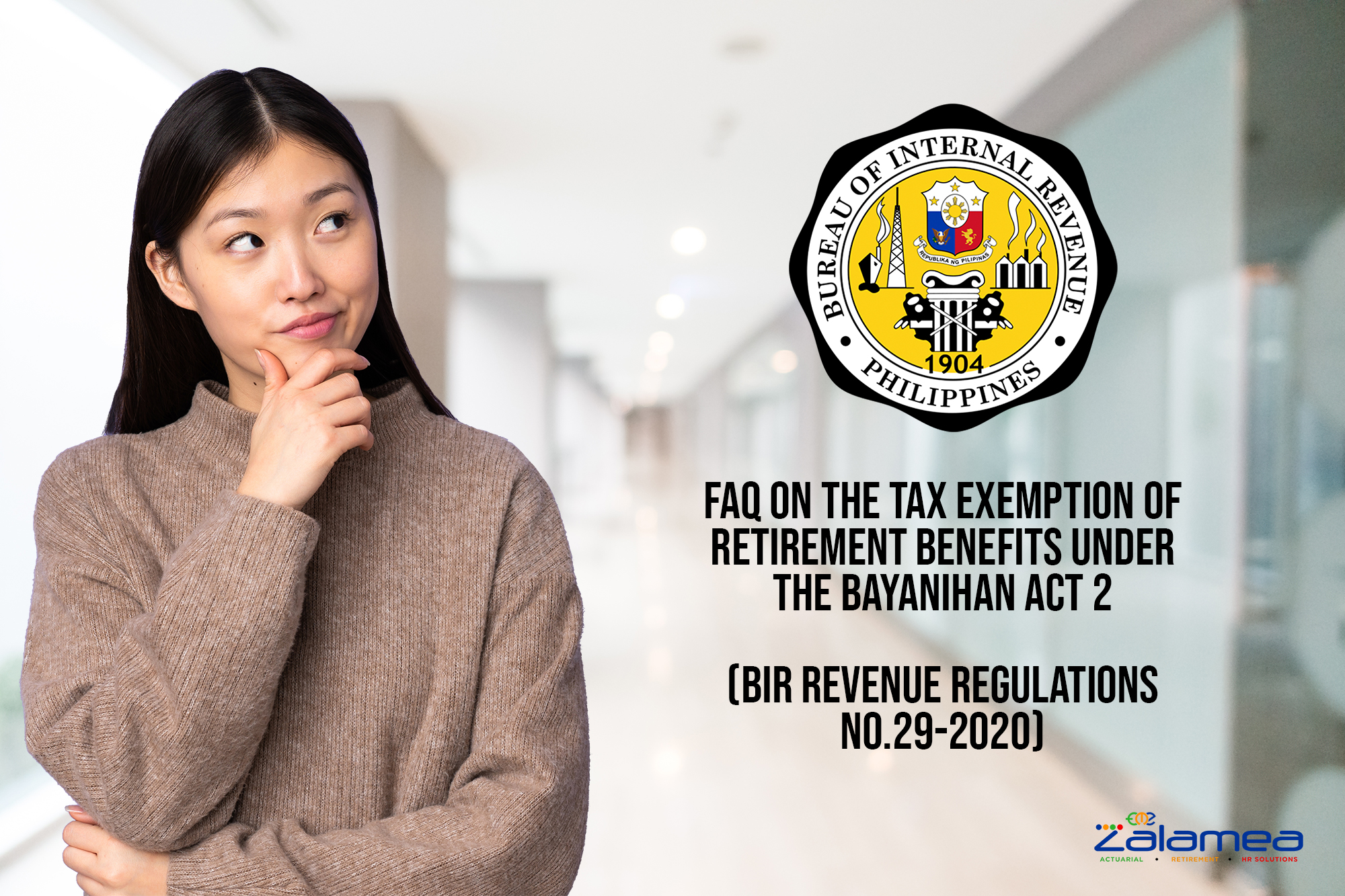1. Our company already has a BIR approved Retirement Plan; thus, retirement benefits are already tax exempt based on RA 4917. What are the advantages of the Bayanihan Act II?
Under RA 4917, only employees who are at least 50 years of age with at least 10 years of service upon retirement will be able to enjoy tax exempt benefits. On the other hand, the tax exemption under Bayanihan Act II does not have any restriction on the age and service of the retiree.
2. Our company does not have a BIR approved Retirement Plan; however, our employer provides voluntary resignation benefits. Will the resignation benefits be subject to tax?
The company has to set up a formal retirement plan and file it to the BIR in order to qualify for tax exemption under RA 4917 and Bayanihan Act II. In addition, it should be noted that voluntary resignation benefits are not covered by the tax exemption under RA 4917 and the Bayanihan Act II.
3. Our company has already set-up a Retirement Plan with a Trustee, however, the company did not file the plan to the BIR for tax exemption. Are the benefits qualified for tax exemption under Bayanihan Act II?
The Retirement Plan should be duly-registered with the BIR in order to qualify for tax exemption under Bayanihan Act II. Since the plan of the company is not yet filed, benefits from the plan will not qualify for tax exemption.
4. The retirement plan of our company is BIR approved. However, the trust account balance of the plan is insufficient to payout the benefits of the retiring employees this year. Thus, the company will make additional payments. Will the additional payments be taxable?
Additional payments made by the company are subject to tax. However, the company may advance the retirement benefit payments and later on reimburse the full amount from the fund once it is sufficient in order to qualify for tax exemption.
5. Our company will undergo a retrenchment program within the year; however, we do not have a BIR approved plan. Do we still need to seek the BIR approval for tax exemption of the said program?
Involuntary separation benefits are excluded from the employee’s gross income and shall be exempt from taxation based on the Tax Code. There is no need to file a Retirement Plan to the BIR for such purpose. However, setting up a Retirement Plan and filing it to the BIR will still be beneficial for the tax exemption of retirement benefits.
6.The BIR approved Retirement Plan of our company offers Early Retirement benefits starting 10 years of service. If an employee who is less than 50 years of age but has already served the company for more than 10 years files for early retirement, will his benefit be tax-exempt?
According to the Bayanihan Act II, the early retirement benefit of the said employee will be exempt from taxation, provided that the retirement benefit will be received by the retiring employee within the period June 5, 2020 to December 31, 2020. Provided further, that the retired employee will not be rehired by the same firm or its related parties within the succeeding twelve-month period.
7. Our company has a BIR approved Retirement Plan which offers voluntary resignation benefits. Will the voluntary resignation benefits be tax exempt?
Voluntary resignation benefits are taxable. The Bayanihan Act II as well as the R.A. 4917 cover retirement benefits only.
8. Our company is offering a special, one-time Early Retirement Program this year. We have no intention to include this in a formal retirement plan. Will the benefits under this program be tax exempt?
The benefits payable under this program are taxable. Only benefits from a BIR approved retirement plan can qualify for tax exemption.
9. If an employee retires according to the company’s BIR approved retirement plan on December 31, 2020, will his benefit be exempt from tax?
If the employee meets the 50 years of age and 10 years of service requirement under RA 4917, then his benefit will be exempt from tax. If he does not meet such requirements, then the benefit may be exempt from tax under Bayanihan Act II if he will be able to receive the benefit by December 31, 2020. It is important to note that only the retirement benefits received from June 5, 2020 to December 31, 2020 are covered by Bayanihan Act II.
10. Our company has a Retirement Plan duly-registered with the BIR. An employee filed for early retirement, and was retired last May 10, 2020. He was able to receive his early retirement benefit a month after his retirement date. Since the employee has is not yet qualified for tax exemption based on RA 4917, his retirement was taxed. However, given the Bayanihan Act II, should his retirement be exempt from tax?
Since the retiree received his retirement benefit within the period covered by the Bayanihan Act II, which is June 5, 2020 to December 31, 2020, then his retirement benefit shall be exempt from tax. Note however that the retiree shall not be re-employed in the same firm and its related parties within the succeeding 12-month period in order to maintain tax exemption.
11. Is the tax exemption period June 5, 2020 to December 31, 2020 stated in the Bayanihan Act II dependent on the retirement date of the employee or the payout date of the benefits?
Only retirement benefits received from June 5, 2020 to December 31, 2020 shall qualify for tax exemption under Bayanihan Act II. Tax exemption under Bayanihan Act II is solely based on the date the employee receives his retirement benefit, regardless of the date of retirement.
12. If an employee who has previously availed tax-exempt retirement benefits under Bayanihan Act II finds a new job within the year, will his future employment be considered as proof of non-retirement?
If such employee is re-employed in the same firm or its related parties within the succeeding twelve-month period, then his benefit will be subject to tax. However, if his future employment is an entity not in any way related to his former company, then his retirement benefit will remain exempt from tax. Note that if the retiree is also eligible for tax exemption under RA 4917, then his retirement benefit shall still be exempt from tax.
Disclaimer: The responses above reflect our opinion based on our own interpretation and consultation with legal and tax consultants. The interpretation and final decision will come from your Trustee.

